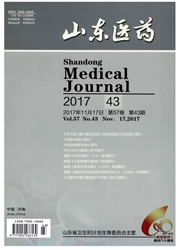

 中文摘要:
中文摘要:
目的探讨脑胶质瘤DNA修复基因O6-甲基鸟嘌呤-DNA甲基转移酶(MGMT)和错配修复基因(MMR)(hMLH1、hMSH2)启动子甲基化状态及其对患者预后和烷化剂化疗敏感性的影响。方法采用甲基化特异性PCR(MSP)方法检测39例脑胶质瘤和6例正常脑组织MGMT、hMLH1和hMSH2基因启动子区的甲基化状态,免疫组化方法测定其蛋白表达。绘制Kaplan-merier生存曲线。结果脑胶质瘤组织MGMT、hMLH1和hMSH2基因启动子区甲基化发生率分别为46.2%、10.3%和20.5%,而正常脑组织相应基因启动子区未发生甲基化;三种基因启动子未甲基化模式与其对应蛋白表达模式相似。MGMT基因甲基化的脑胶质瘤患者存活率显著高于未甲基化者(P〈0.05);MMR基因甲基化患者中MGMT基因甲基化与未甲基化者的生存期无统计学差异(P〉0.05)。结论hMLH1、hMSH2及MGMT甲基化是脑胶质瘤发生过程中常见的分子事件;联合检测MGMT、hMLH1和hM-SH2基因启动子甲基化状态可判断脑胶质瘤患者的预后及其对烷化剂化疗的敏感性。
 英文摘要:
英文摘要:
Objective To explore the status of promoter CpG island methylation of 06-methylguananine - DNA methyltransferase (MGMT), mismatch repair genes (hMLH1, hMSH2) in glioma and the effect on survival of patients. Methods Methylation-specific PCR (MSP) were employed to detect promoter CpG island methylation of the MGMT, hMLHI as well as hMSH2 gene in 39 surgical tumor tissue samples from glioma patients and 6 normal tissue samples. Kaplan-Meier curves were estimated for overall survival, according to MGMT, hMLH1 and hMSH2 promoter mehylation status. Results Promoter CpG island methylation of MGMT, hMLH1 and hMSH2 were detectable in 46.2%, 10.3% and 20.5% of glioma tumor DNA respectively, but no detectable in any normal tissue. For the entire population of 39 glioma patients who were enrolled in operating treatment combined with radiotherapy and chemotherapy with alkylating agents including ACNU, there was a significant difference in overall survival between patients with methylated MGMT promoter and those with an unmethylated MGMT promoter (P 〈 0.05 by the log-rank test). But for the subgroup of 39 patients in whom methylated MMR (hMLH1 or hMSH2) promoter could be determined, there was no significant difference in overall survival between patients whose tumors had MGMT promoter methylation and those whose tumors did not (P 〉 0.05). Conclusions Promoter CpG island methylation may be a frequent event in glioma carcinogenesis. Detection of the methylated sequences of MGMT, hM- LH1 and hMSH2 appears to be promising as a predictive factor in primary glioma.
 同期刊论文项目
同期刊论文项目
 同项目期刊论文
同项目期刊论文
 期刊信息
期刊信息
